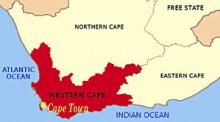Regional Background
Bonnievale is a very small place in Western Cape Province of South Africa. The city with around 3000 people is very poor and it is hard for most people to make a living. Often youth get involved in gangs. Teenage pregnancy is one of our biggest problems together with poor households and unemployment among the youth.
South Africa is a very big country with different cultures and beliefs. In 1994 we became a rainbow nation with the release of former president Nelson Mandela. This is a very nice and good country to live in. In South Africa we believe in “Ubuntu”, meaning that we care about the next person.
Only months after taking up office, Frederik Willem de Klerk rang in the end of Apartheid in an historic speech at the Parliament in February 1990, declared himself in favor of a democratic South Africa. The ANC was no longer banned.
Some days later, Nelson Mandela, the President of the ANC, was released from prison on Robben Island, after 27 years behind bars. Earlier, in secret negotiations with the ANC, the government had agreed to refrain from violence and work for a peaceful transition and a new constitution. The process of rapprochement was slow in the beginning, particularly because of differences and power struggles between the Xhosa-dominated ANC and the Zulu-led Inkatha Freedom Party, resulting in violence in the townships.
In the meantime, de Klerk had to deal with growing criticism from his own National Party. To counter that, he had his policy confirmed in a referendum voted on by the white population. Almost 70 per cent supported a continuation of the reforms.
After a further two turbulent years, eventually a new constitution was drafted. In April 1994, the first democratic elections were held in South Africa. As expected, the ANC gained the overwhelming majority. Nelson Mandela was inaugurated on the 10th of May 1994 as the first black African President of the New South Africa. The first Vice-President was Thabo Mbeki. F.W. de Klerk became second Vice-President of the Interim Government.
The Nobel Peace Prize laureate Nelson Mandela retired in 1999. Thabo Mbeki, his First Vice President, became president of the ANC and President of the Republic of South Africa. Mbeki's style of government was progressively seen as being autocratic. And his disastrous stand on two of the most pressing problems of the country, AIDS and the regime in neighboring Zimbabwe, earned him criticism in large parts of the population.
When Mbeki suspended his vice president, Jacob Zuma, who was facing prosecution for rape, corruption and racketeering, the resistance against him grew tremendously, especially among the youngsters in the ANC Youth League, who are Zuma's most ardent followers. At the ANC convention in Polokwane on December 16, 2007, the populist Zuma was elected new party president and thereby automatically as candidate for the presidency of the country. Some months later Mbeki was pressured into resigning from the office of State President.
In the meantime, an opposition party has formed under the leadership of former defense minister Mosiuoa Lekota. Numerous intelligent people are gathered in its ranks, mostly from the ANC, who are willing to fight corruption and restore democracy. They often appear in newspapers, but are virtually banned from TV. Now Zuma has become president, though he gives the overall impression of regarding democratic values not highly. He is relatively uneducated, sucks up to the left wingers, at the same time leads a traditional life with a big collection of wives -- the latest added only weeks ago -- and is prone to violent talk and to bullying minorities. Many South Africans fear for the future.





